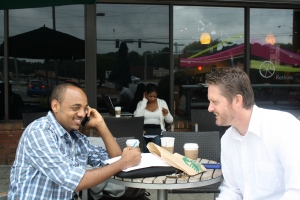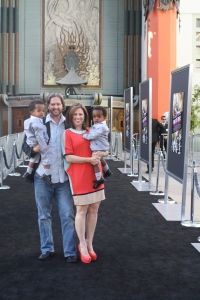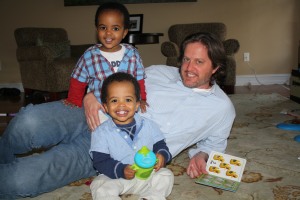
"Hello... Amanuel?" Those were the only words I understood of the conversation that took place between my new friend, Mesfin, and Amanuel, the father of my adopted twin sons, Samuel and Asher. Sitting outdoors at a Starbucks, all I could do was marvel at the sight of Mesfin casually talking in Sidamigna on his cell phone to my sons' birth father in rural Ethiopia with the same ease that my wife calls me to say, "Don't forget to pick up diapers at the store."

When my wife traveled to meet with the twins' father in his village in Dec. 2010, it was a joyous occasion. Amanuel was very hospitable and overwhelmed with gratefulness that they had come to visit him. Before Meredith left, Amanuel's mother hugged her and, through translation, told her, "Now I know their mother will rest in peace."
The twins are now happy, healthy, and have had an amazing first two years of life. In just 14 months, the boys went from severely ill and dying to appearing with Jennifer Lopez in a movie and walking (or should I say "toddling") the red carpet in LA. It's been an inspiring story, and one that has focused unexpected attention and publicity on our family.

Recognizing that we have been given a platform we didn't expect, Meredith and I feel deeply that the twins' story should be told. We want to inspire people to ask, "What more can I do for orphaned children and to help provide medical resources in developing countries so that women like Samuel and Asher's mother not only survive but thrive?"
As a writer, I decided to begin writing a book about the boys' journey thus far. But to do that I needed to know more. I had not been to meet Amanuel and the twins' family. If only there was a way I could talk to Amanuel myself, I thought.
We contacted the twins' orphanage to inquire if the director would be open to answering some questions about the boys' life there. To our amazement he informed us that he had their birth father's phone number. We could call Amanuel directly!
Fast-forward to a few weeks ago. Recently, some friends introduced us to Mesfin, a young man of Ethiopian birth who is fluent in English, Amharic (the national language of Ethiopia), and Sidamigna (the regional language of Sidama, where the twins were born). Mesfin agreed to act as my interpreter. We met at a Starbucks and gave Amanuel a call.
"Hello, Amanuel?" Mesfin was off and running, rattling off words in Sidamigna that I had no way of understanding. For all I knew he was saying, "Hello, Amanuel. I'm sitting here with this creepy white guy who's raising your children. I wouldn't let this guy feed my hamster; what were you thinking letting him adopt your kids?"
After having to redial due to bad reception, Mesfin smiled and relayed to me Amanuel's pleasure that we'd called. "He is very excited we called! He is saying, 'Oh my gosh! How are the boys? How is the family? Tell them that I love them all! I am so glad they called. This is a blessing!'"
Through Mesfin, Amanuel and I conversed for nearly ½ hour. I told him that the boys were fine, that it was an honor to speak to him, and that we think about him and his family often. Mesfin asked Amanuel if I could ask a few questions about his life and the day the twins were born. Amanuel graciously said yes.
I asked Amanuel what he farmed. Corn, beans, and ensete (false banana) were the answers. I enquired as to whether all of his farming was subsistence or if he grew any for market. Amanuel responded that he rarely grew enough to feed his family. When I asked what he did for income, he told me that at the time the twins were born, he would use his donkey-drawn cart to transport people from one village to another in exchange for a birr (Ethiopia's standard currency -- equal to 1/16 of a dollar at the time we visited the country). However, since our visit, Amanuel's donkey had died, leaving him with no way to pull his cart or make money. Humbled and embarrassed by my own tendency to complain about financial challenges, I elected not to press him further on his means of income.
Most personal of all, Amanuel shared with me that, prior to Samuel and Asher's birth, Amanuel's wife, Martha, had given birth to six children. The first were twins. Only one, Amanuel's daughter (now 10) survived. Next, Martha gave birth to a boy who died at birth, then a second set of twins, both of whom died. She then gave birth to Amanuel's oldest son, who is now 8. Finally, came Samuel and Asher.
Mothers in rural Ethiopia usually give birth at home with only the help of local women. But given Martha's history and her great level of discomfort, Amanuel went to fetch a trained midwife. He walked for 2 ½ hours to the home of the nearest midwife, convinced her to come with him, and raced back home.
I could see Mesfin's face fall as Amanuel continued, "When I returned home, the twins had been born, and Martha had died giving birth."
Hearing Mesfin relay to me all that Amanuel was saying, I felt my heart both breaking and filling with admiration for Amanuel. My heart broke for the unimaginable pain he had endured, yet I was in awe of him and admired him deeply for his strength and the dignity with which he continued to love and lead his family.
Amanuel shared how the days that followed were hard. For several days after the funeral, he attempted to tend to his new babies. But, even with his mother's help, the twins were dying. All he had that they could digest was water. There was no one to nurse them. At his mother's urging, and with great sadness, he did the only thing he could do. He had his mother, his uncle, and a member of the Red Cross take the boys to the orphanage.
I wrote frantically as Mesfin relayed to me all that Amanuel was saying. A spectrum of emotions ran through me as I tried to process all I was hearing. Some of it I already knew. Some I could have guessed. Some was harder than I ever could have imagined.
Towards the end of the conversation, I jumped on the phone. I wanted to hear Amanuel's voice myself. I would imagine he probably wanted to hear mine as well. "Hello, Amanuel," I said.
"Hello," he enthusiastically responded. That was all we could say that we both could understand.
For all the young farmer had been through, all I could detect in his voice was joy and gratitude.
He was joyful that his sons were doing well. He was grateful for me and Meredith and the fact that we had contacted him. And he was faithful, believing that God had always been good and in control.
Talking to Amanuel, I felt blessed and elated. But I also felt small. Through the words and life of this brave, faithful man, I was confronted with my own selfishness. Here, in middle-class America, I have it so easy. For all the troubles I have, I have never once worried where my children would sleep, what they would eat, or whether or not they would survive childbirth. I watched my wife go through three c-sections, never once doubting that she would be okay.
And yet, I can lose my faith so easily. At the slightest financial challenge or change in circumstance, I can get out of sorts, wondering "Why me, God?"
Amanuel is a man whom the world looks at and sees as impoverished and in need. I see him as my brother and friend. Speaking with him I realized that he is in many ways a stronger and better man than most. He has faced challenges that would crush most men. Yet he not only survives them, he overcomes them with joy, faith, peace, and an undying hope that most could only wish for and many could not even begin to fathom.
Before getting off the phone, I thanked Amanuel, told him that we love him, and assured him that we would call again soon. He has given me so much in both my sons and more than one spiritual lesson. I hope to make him proud in the way I raise Samuel and Asher. Until the next time Mesfin and I say, "Hello... Amanuel?"
